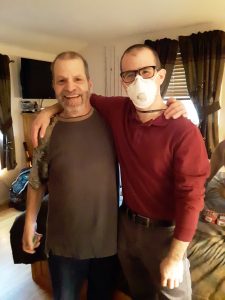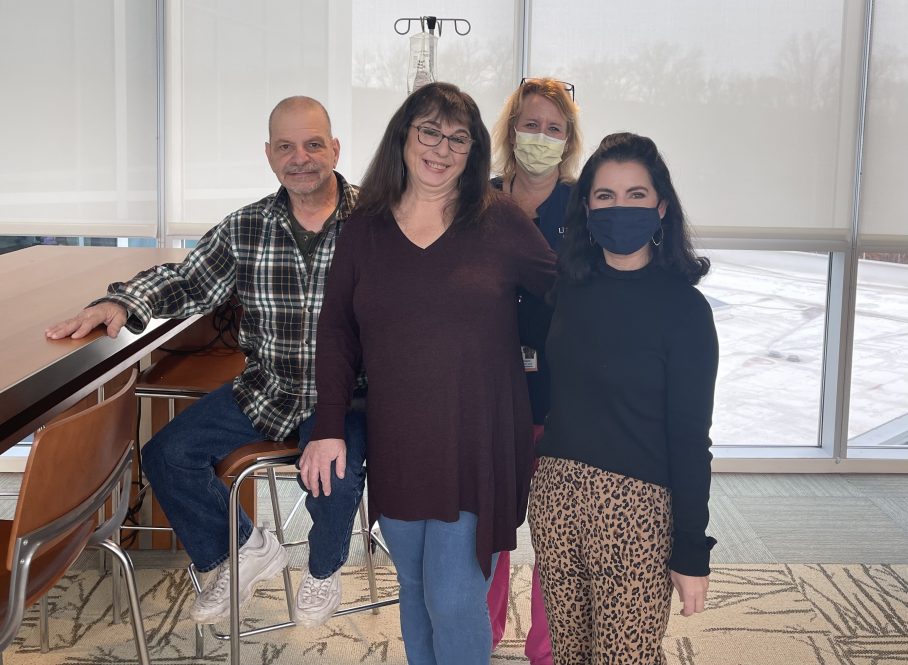Kim Siccardi had started smoking when she was 13-years old. In 2011 she needed surgery on her wrist, however, the surgeon at the time required her to quit smoking to do the procedure, so she and her husband, Henry quit.
She was living in New York and enjoying her 24-year career working for a breast cancer surgeon. One day her cough became so intense, it caused her to break a rib, so the surgeon she worked for ordered a CT scan. It was then that a nodule in her lung was detected.
It was seven years after quitting smoking, at 52 years old, that the nodule was found and she started a low dose screening protocol. When she moved to Connecticut she was referred to Dr. Omar Ibrahim, director, Interventional Pulmonary at UConn Health.

Kim had a ground-glass nodule that was suspicious for lung cancer and had grown over time. This type of lesion appears hazy on computed tomography (CT).
A wedge resection was performed on her upper right lobe that proved to be 1A early detection of lung adenocarcinoma, a subtype of non-small cell lung cancer. Lung adenocarcinoma is the most common primary lung cancer seen in the United States. It falls under the umbrella of non-small cell lung cancer and has a strong association with previous smoking. While incidence and mortality have declined, it remains the leading cause of cancer death in the United States.
The cancer had not spread outside the lung and she did not need radiation or chemotherapy after the resection as it is considered treatment and cure. She continues to get scans regularly and has 95% breathing capacity in her lungs.
“Dr. Ibrahim and everyone at UConn have been phenomenal,” says Siccardi.
“What I really like about UConn Health is that everyone here is wonderful and they work as a team,” says Kim. “All my doctors confer with each other to give me the best treatment.
In cancer care at the UConn Health Carole and Ray Neag Comprehensive Cancer Center, there is a multidisciplinary approach to treating cancer. A team of health care professionals with different specialties work together at a tumor board to review patient cases and determine the best treatment plan for that patient.
“Here at UConn Health we take pride in addressing each patient individually and look at their risk in context with how the nodule looks and the options we have to treat for the best outcome,” says Ibrahim.
Kim’s husband Henry had also been a lifelong smoker, having smoked two packs a day and had a significant family history of lung cancer. He also quit in 2011 along with Kim.
“I quit cold turkey, it was the only way for me, you fight it and win,” says Henry. “You can do it, if I can quit anyone can. Take it minute by minute.”
Henry had started the low dose screening protocol due to Kim’s nodule detection and a small nodule was found in his lung. Ibrahim kept a close eye on him and he eventually developed a new aggressive lesion on the lung. The lesion was biopsied and found not to have spread beyond the lung to the lymph nodes.
Last June, Henry was diagnosed with 1A2 large neuroendocrine carcinoma and a lobectomy of his left lower segment was performed. Pathology found a genetic mutation that revealed it had the features typical of small cell cancer and was more aggressive than the original biopsy indicated.
Large-cell neuroendocrine carcinomas of the lung are rare tumors representing 1–3% of all primary lung cancers. Patients with this type of lung cancer are predominantly male, older, and heavy smokers. This type of cancer is rare and typically found in patients at Stage 4 when symptoms appear and it is too late. However, because Henry had started the screening protocol, he was caught early at stage 1A2.
“If he wasn’t in the screening program, his story would be very different,” says Kim.
“After surgery, I felt great, I could breathe fine and didn’t even feel like I had surgery,” said Henry.
Most localized neuroendocrine tumors are successfully treated with surgery alone. However, since Henry’s cancer was more aggressive it was deemed more beneficial for survival for Henry to undergo chemotherapy treatment.
“We are optimistic that this was caught early and with the treatment, we are still working toward curing this cancer,” says Ibrahim. “Lung cancer is best treated when detected early and found through lung cancer screening as it was in this case.”
“I have too much to live for, I want to be around for a long time,” says Henry. “This is my fight and I’m gonna make it, that’s for sure.”
Henry started his chemotherapy last month and tolerated it fairly well with only some fatigue. A week later, he had very low blood pressure and high blood sugar levels and went to the Emergency Department. After changing some of his medications, he has improved tremendously and is starting his second round of chemotherapy. He will undergo four rounds of chemotherapy.
“Everyone here is so nice, the nurses are angels,” says Henry. “They make sure you are comfortable, respond immediately, and are big-hearted.”
For the Siccardi’s, they are grateful that a broken rib, led to early diagnosis of lung cancer for both of them and for the care they both received at UConn Health. They encourage anyone who smokes to quit and those eligible to get screened.
UConn Health also holds a special place for them as their son is now training for his medical career as a third-year medical student at the UConn School of Medicine.
“I have never had a bad experience here and I’m truly grateful to everyone at UConn,” says Kim. “I am thrilled that my son is being trained and learning alongside these amazing doctors and the team at UConn Health.”
Early detection of lung cancer is key to surviving. Patients who meet the criteria that are aged 50 to 80 years who have a 20 pack-year smoking history and currently smoke or have quit within the past 15 years should have an annual screening for lung cancer with low-dose computed tomography.
For more information on lung cancer screening, call UConn Health at 844-777-LUNG to discuss your health history and answer a few questions. A nurse navigator will call you back to discuss your eligibility for the screening test.



